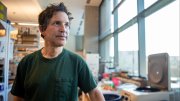David Baker ’84, a biochemistry professor at the University of Washington, has been named a winner of the Nobel Prize in Chemistry for creating entirely new proteins. In 2003, using a software platform he had invented called Rosetta, Baker designed a protein made of 93 amino acids and synthesized it in his lab. It was, the Nobel announcement said, “unlike any other protein.” Since then, Baker has created numerous other proteins that catalyze reactions not found in nature and whose functions can be used in pharmaceuticals, vaccines, nanomaterials, and tiny sensors. He and his lab now use artificial intelligence (AI) methods in their work. Baker heads the University of Washington’s Institute for Protein Design.
Baker shares the prize with John Jumper and Demis Hansabis of Google DeepMind in London, who won for their work using AI to predict the structure of millions of proteins, allowing researchers to better understand antibiotic resistance and create images of enzymes that can break down plastic.
On his faculty webpage, Baker describes his work this way: “Our research is focused on the prediction and design of protein structures, protein folding mechanisms, protein-protein interactions, protein-nucleotide interactions, and protein-ligand interactions. Our approach is to use experiments to understand the fundamental principles underlying these problems, to develop simple computational models based on these insights, and to test the models through structure prediction and design.”
Baker told an interviewer at the Howard Hughes Medical Institute, where he is an investigator, that his initial interest in protein folding began when he was an undergraduate biology concentrator at Harvard: “We had to write a term paper on something to do with biochemistry, and I asked the professors if I could look at protein folding,” he said. “They discouraged me, saying ‘no one really knows how it works.’” Years later, as researcher with his own lab, he returned to the question and answered it.









